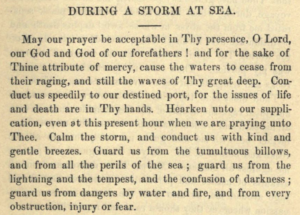Contributor(s): Shared on: 19 June 2020 under the Creative Commons Zero (CC 0) Universal license a Public Domain dedication Categories: Tags: | Contribute a translation | Source (English) |
|---|
|
Prayer during a Storm at Sea | |
May our prayer be acceptable in Thy presence, O Lord, our God and God of our forefathers! and for the sake of Thine attribute of mercy, cause the waters to cease from their raging, and still the waves of Thy great deep. Conduct us speedily to our destined port, for the issues of life and death are in Thy hands. Hearken unto our supplication, even at this present hour when we are praying unto Thee. Calm the storm, and conduct us with kind and gentle breezes. Guard us from the tumultuous billows, and from all the perils of the sea; guard us from the lightning and the tempest, and the confusion of darkness; guard us from dangers by water and fire, and from every obstruction, injury or fear. | |
From the treasury of the elements, O God, send forth a favorable wind. May all who have charge of the vessel be faithful and vigilant, active and skillful in directing or obeying, that so we may speedily and safely be brought to our destined port. Thou who madest the sea canst still the waves thereof; Thou who didst create the winds, canst allay their rage. O Lord! guard our souls which depend upon Thee, and deliver us from evil. As we put our trust in Thee, let us never be confounded. And as for us all, we will bless Thy name, O God! from henceforth and for evermore. Amen. |
“Prayer During a Storm at Sea” is one of thirty prayers appearing in Rabbi Moritz Mayer’s collection of tehinot, Hours of Devotion (1866), of uncertain provenance and which he may have written. –Aharon Varady Source(s)
 Rabbi Moritz Mayer (originally Moses Maier, later Maurice Mayer; 1821-1867) born in Dürckheim-on-the-Haardt, Germany, fled to the United States and to New York as a political refugee of the 1848 revolution. In 1859, after seven years as the rabbi of Ḳ.Ḳ. Beth Elohim in Charleston, South Carolina, he returned in poor health to New York where he contributed frequently to the Jewish press, and translated various German works into English: Rabbi Samuel Adler's catechism, Abraham Geiger's lectures on Jewish history, and Ludwig Philipson's pamphlet, Haben die Juden Jesum Gekreuzigt? (the Crucifixion from the Jewish Point of View), et al. In 1866, a number of his English translations of Fanny Neuda's teḥinot in German (from her Stunden Der Andacht, 1855/1858) were published in a volume he titled Hours of Devotion. The work also included a number of his own prayers as well as those of Marcus Heinrich Bresslau. The following year, Moritz Mayer passed away. He was 45 years old.(We are indebted to Anton Hieke for his research on Mayer, " Rabbi Maurice Mayer: German Revolutionary, Charleston Reformer, and Anti-Abolitionist" published in Southern Jewish Life, 17 (2014), pp. 45-89.)For Mayer's translations of prayers by other authors, please visit here. Aharon Varady (M.A.J.Ed./JTSA Davidson) is a volunteer transcriber for the Open Siddur Project. If you find any mistakes in his transcriptions, please let him know. Shgiyot mi yavin; Ministarot naqeni שְׁגִיאוֹת מִי־יָבִין; מִנִּסְתָּרוֹת נַקֵּנִי "Who can know all one's flaws? From hidden errors, correct me" (Psalms 19:13). If you'd like to directly support his work, please consider donating via his Patreon account. (Varady also translates prayers and contributes his own original work besides serving as the primary shammes of the Open Siddur Project and its website, opensiddur.org.) Read a comment / Leave a comment (moderated) Works of related interest: |












Leave a Reply